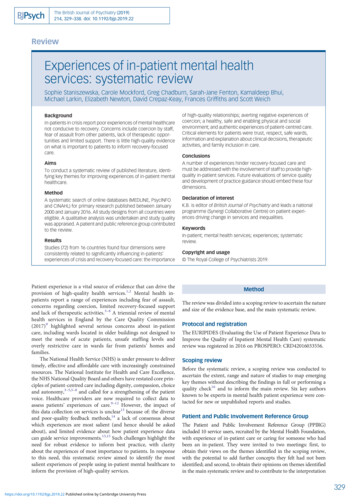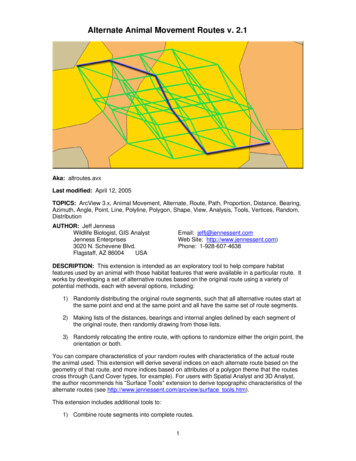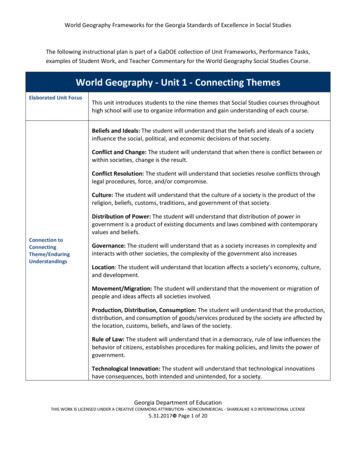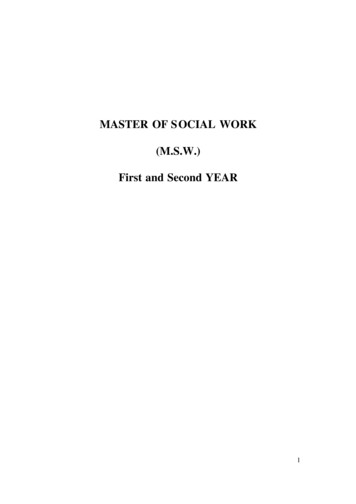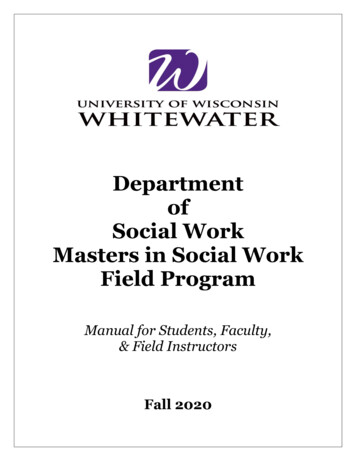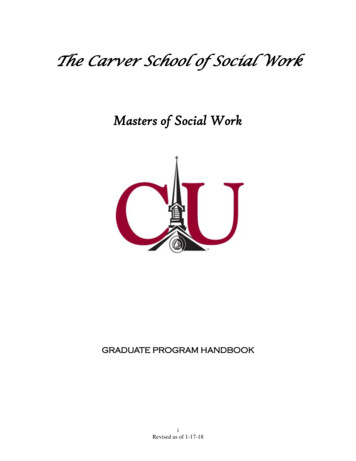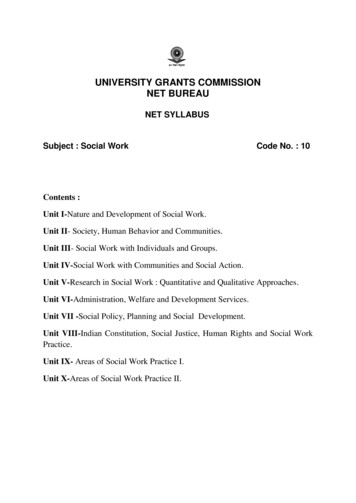
Transcription
Social Work: Themes, Issues and Critical Debates
Other titles by Robert Adams:A Measure of Diversion? Case Studies in IT (co-author)Prison Riots in Britain and the USAProblem-solving with Self-Help Groups (co-author)Protests by Pupils: Empowerment, Schooling and the StateQuality Social WorkSelf-Help, Social Work and EmpowermentSkilled Work with PeopleSocial Work and EmpowermentThe Abuses of PunishmentThe Personal Social Services: Clients, Consumers or Citizens?Other titles by Malcolm Payne:What is Professional Social Work?Social Work and Community CareLinkages: Effective Networking in Social CareModern Social Work Theory: A Critical IntroductionWriting for Publication in Social Services JournalsSocial Care in the CommunityWorking in TeamsPower, Authority and Responsibility in Social Services: Social Work inArea TeamsOther titles by Lena Dominelli:Community Action and Organising Marginalised GroupsWomen in Focus, Community Service Orders and Female OffendersLove and Wages: The Impact of Imperialism, State Intervention andWomen's Domestic Labour on Workers Control in AlgeriaAnti-Racist Social WorkFeminist Social Work (co-author)Women and Community ActionWomen Across Continents: Feminist Comparative Social PolicyGender, Sex Offenders and Probation PracticeGetting Advice in UrduInternational Directory of Social WorkAnti-Racist Perspectives in Social work (co-author)Anti-Racist Probation Practice (co-author)Sociology for Social Work
Social WorkThemes, Issues andCritical DebatesEdited byRobert Adams, Lena Dominelliand Malcolm PayneConsultant editor: Jo CamplingMACMIllAN
Selection, editorial matter and introduction Robert Adams, LenaDominelli and Malcolm Payne 1998.Individual chapters (in order) Lena Dominelli; Steven Shardlow;Chris Jones; Carol and Alan Walker; Suzy Braye and Michael PrestonShoot; Audrey Mullender and Stella Perrott; Lena Robinson; JoyceLishman; Angela Everitt; Malcolm Payne; Helen Cosis-Brown; DavidWard; Marjorie Mayo; David Howe; Katy Cigno; Mark Doel; MaryLangan; Joan Orme; Beverley Burke and Philomena Harrison; NigelParton and Wendy Marshall; Robert Adams; Lorraine Waterhouse andJanice McGhee; Neil Thompson; David Smith 1998.All rights reserved. No reproduction, copy or transmission ofthis publication may be made without written permission.No paragraph of this publication may be reproduced, copiedor transmitted save with written permission or in accordancewith the provisions of the Copyright, Designs and PatentsAct 1988, or under the terms of any licence permitting limitedcopying issued by the Copyright Licensing Agency, 90 TottenhamCourt Road, London W1P 9HE.Any person who does any unauthorised act in relation tothis publication may be liable to criminal prosectuion andcivil claims for damages.The authors have asserted their right to be identified as theauthors of this work in accordance with the Copyright, Designsand Patents Act 1988.First published 1998 byMACMILLAN PRESS LTDHoundmills, Basingstoke, Hampshire RG21 6XSand LondonCompanies and representativesthroughout the worldISBN 978-1-349-14400-6 (eBook)ISBN 978-0-333-68818-2DOI 10.1007/978-1-349-14400-6A catalogue record for this book is availablefrom the British Library.This book is printed on paper suitable for recycling andmade from fully managed and sustained forest sources.109 8 7 6 5 4 3 2 107 06 05 04 03 02 01 00 99 98Editing and origination byAardvark Editorial, Mendham, Suffolk
ContentsList offigures and tablesNotes on the contributorsIntroduction Robert Adams, Lena Dominelli and Malcolm PaynePART I1234SOCIAL WORK IN CONTEXTAnti-oppressive practice in context Lena Dominellixxixv13Anti-oppressive practice: an old-new paradigmThe struggle over anti-oppressive practice - an old-new controversyThe 'backlash' - a rejection of anti-oppressive practice by its opponentsStructural constraints limiting the spread of anti-oppressive practiceThe future of anti-oppressive practiceConclusionFurther reading3111416192122Values, ethics and social work Steven Shardlow23Introduction and contextThe scope of 'social work values'Understanding values and ethicsEthics and work with service usersSocial work and societyNew values: empowerment, consumers and structural challengeEndnote - netting the fishFurther readingSocial work and society Chris JonesIntroductionSocial work, class and povertySocial work as conservative welfareUnloved social workFurther readingSocial policy and social work Carol and Alan WalkerIntroductionThe current social policy contextPoverty and social workWho are the poor?But are the poor really poor?Policies on povertySocial policy and social exclusionCommunity careConclusionFurther 2545555v
viSocial Work: Themes, Issues and Critical DebatesS Social work and the law Suzy Braye and Michael Preston-Shoot S66IntroductionContextCritical themesCritical debatesConclusionFurther reading56575962SocW work and organisations Audrey Mullenderand Stella PerrottIntroduction: the organisational context of social workOrganisational forms and issuesWorking in organisations: oppressive or empowering?ConclusionFurther reading789Social work through the life course LenaIntroductionInadequacies of Western psycholo Toward a black perspective in psy ologyAttachmentBlack identity developmentSocial work with black familiesSocial work with older black peopleConclusionFurther readingRobinsonPersonal and professional development Joyce roductionThe context and nature of personal and professional developmentin social workOur motivation for social workSelf-awareness and reflectionManaging complexityManaging uncertaintyManaging changeSupervisionPromoting and developing good practice and service provisionEducating and training the next generationConclusionFurther reading101102102Research and development in social work Angela Everitt104IntroductionEnhancing research in practiceTheory and practice in researchCritical social researchUsers and beneficiaries of social work researchFurther readingPART II THEORIES FOR PRAcnCE IN SOCIAL WORK10 Social work theories and reflective practiceMalcolm PayneIntroduction: reflecting on reflectingReflecting on the social work role90939395%979899104104108110113115117117119124
ContentsviiUsing theory reflectivelyReflecting on integration and dissentUsing Part IT reflectivelyFurther reading12913213513711 Counselling Helen Cosis Brown13813814014514714814812 Groupwork David WardWhere has all the groupwork gone?The demethoding of social workGroupwork and work-in-groupsA continuing need for groupworkRe-establishing groupworkFurther reading14914915015215415615913 Community work Marjorie Mayo16014 Psychosocial work David Howe173173174175IntroductionTheoretical groupings within counsellingCounselling and social workIssuesConclusionFurther readingIntroductionThe context'Mapping' community work: definitions and recent historyCommunity work and social workAlternative perspectives and implications for practiceSome current issues and dilemmasConclusionFurther readingIntroductionThe socialness of selfInner working modelsAttachment and relationship-based theories as examples ofa psychosocial perspectiveAssessmentsPracticeConclusionFurther reading16016116216416417017117217718118218318315 Cognitive-behavioural practice Katy Cigno18418418518718919119519519516 Task-centred work Mark Doel196196197198202IntroductionThe policy context of social workCognitive-behavioural practiceAreas of practice ande links with effectivenessAssessment and interventionConclusionAcknowledgementFurther readingIntroductionTask-centred work and other social work ideasThe essence of task-centred workIssues
viiiSocial Work: Themes, Issues and Critical DebatesConclusionFurther reading20420517 Radical social work Mary Langan20718 Feminist social work Joan Orme21819 Anti-oppressive practiceBeverly Burke and Philomena Harrison22920 Postmodemism and discourse approaches to social workNigel Parton and Wendy Marshall240III SOOAL WORK PRAcnCE21 Social work processes Robert Adams25125322 Social work with children and familiesLorraine Waterhouse and Janice McGhee273IntroductionThe roots of radical social workThe radical social work diasporaThe end?ConclusionFurther readingIntroduction and contextFeminist theories for social workFeminist social work practiceIssuesConclusionFurther readingIntroductionWhat is anti-oppressive practice?Amelia's story as told to a friendTheory into practiceFurther readingIntroductionWhat is meant by postmodernity and postmodernism?Social work and the postmodemThe importance of discourse and languagePossible implications of postmodem perspectives for practiceConclusionDedicationFurther readingPARTIntroductionChanging contexts and social work practiceChanging approaches and social work practiceImplications for practiceConclusionFurther readingIntroductionSocial contextChanging family patternsThe status of childrenSettingChild-care policy and 2273274276277277280
ContentsPartnership, prevention and support in practiceConclusionFurther readingix28529329623 Social work with adults Neil Thompson29724 Social work with offenders David Smith322BibliographyiluthorindexSubject index347380IntroductionThe context for practiceSystematic practiceThe life courseRoles and tasksConclusion: developing good practiceFurther readingIntroductionThe policy backgroundWorking with juvenile offendersWorking with adult offendersSocial work, restorative justice and community safetyConclusion: towards a wider conception of effectivenessFurther 84
List offigures and tablesFigures23.123.223.3Client groups and settingsThe social work processThe information balance299305311Tables4.1Number of people living in or on the margins ofpoverty in 1979,1989 and 199213.1 Two perspectives on community work13.2 A continuum of community work models?13.3 Beyond a continuum? Alternative perspectives oncommunity care, community organisation andcommunity developmentx47166167169
Notes on the contributorsRobert Adams is a qualified social worker who worked in the penal system forseveral years, latterly as Deputy Governor of a young offenders' institution,before running a community-based social work project for Bamardo's. He haswritten extensively about youth and criminal justice, social work and thepersonal social services, and protest and empowerment. He is currentlyProfessor of Human Services Development at the University of Lincolnshireand Humberside.Suzy Braye is Assistant Community Social Services Manager with DerbyshireCounty Council. She has a range of professional experience in practice, education, staff development and management, with professional interests in children's services and mental health. She is joint author, with MichaelPreston-Shoot, of Practising Social Work Law, 2nd edn (1997) and EmpoweringPractice in Social Care (1995). Since 1990, they have published articles exploringpartnership, empowerment, anti-oppressive practice and social work law.Beverley Burke is Senior Lecturer on the DipSW course at Liverpool JohnMoores University. Her current work includes teaching and training on antioppressive practice to students and practitioners. Trained as a generic socialworker, her main practice has been largely in the area of child protection. Shehas recently been involved in therapeutic work with women survivors ofsexual abuse.Katy Cigno is a Senior Lecturer at the University of Hull and a Specialist Practice Teacher for Wakefield Community and Social Services Department. Shewas a founder member of the Behavioural Social Work Group, which shecurrently chairs.Helen Cosis Brown is Head of Department of Social Work, Counselling,Learning Disabilities and Mental Health Nursing at the University of Hertfordshire. She was a social worker and team leader for ten years in an inner Londonborough. She has continued to offer training in the field of fostering and adoption and has a number of publications relating to social work practice withlesbians and gay men.Mark Doel is Professor of Social Work and Head of the School of Social Workand RNIB Rehabilitation Studies at the University of Central England in Birmingham. He trained as a task-centred practitioner in 1981 and has used the taskcentred method extensively in his practice, teaching, writing and research. Sincexi
xiiSocial Work: Themes, Issues and Critical Debates1994, he has has been developing task-centred programmes at post-qualifyinglevel with colleagues at Sheffield University and Wakefield Social ServicesDepartment.Lena Dominelli is Professor of Social and Community Development in theDepartment of Social Work Studies at the University of Southampton where sheis the Director of the Centre for International Social and Community Development. She is also currently the President of the International Association ofSchools of Social Work. Besides being an educator and researcher, she has hadpractice experience as a social worker, probation officer and community worker.She has published numerous articles and 14 books, the most recent being Antiracist Social Work, 2nd edn and Sociology for Social Work.Angela Everitt is an Honorary Research Fellow at the University of Durham and,with her partner Pam Carter, runs 'Reading Lasses', a second-hand radical bookshop in Wigtown, Scotland's Book Town, specialising in women's studies andsocial studies. For a number of years, she worked in social work education and insocial research, undertaking research and evaluation studies with a wide varietyof statutory and voluntary organisations and community groups.Philomena Harrison is Senior Lecturer on the DipSW course at Liverpool JohnMoores University. Her current work includes teaching and training on antioppressive practice to students and practitioners. Trained as a psychiatric socialworker, her main practice experience has been with children and families. She iscurrently undertaking direct work around issues of identity with black childrenwho are using Personal Social Services.David Howe is Professor of Social Work at the University of East Anglia,Norwich. His research and writing interests include child maltreatment, familysupport, attachment theory and adoption. He is the editor of the journal Child andFamily Social Work. His two most recent books are Attachment Theory for SocialWork Practice and Patterns of Adoption.Chris Jones is Professor of Social Policy and Social Work at the University ofLiverpool, and head of the Department of Sociology, Social Policy and Social WorkStudies. He is a Marxist academic whose recent publications have been concernedwith current developments in Britain's social work policy and education.Mary Langan is Senior Lecturer in Applied Social Sciences at the Open University. In the early 1970s, she was an inner city social worker and an active participant in the radical social work movement. She has written extensively on socialpolicy, social work and health in Crises in the British State 1830-1930 (1985, withBill Scharz), Radical Social Work Today (1989, with Phil Lee), Women, Oppression andSocial Work (1992, with Lesley Day), Criminological Perspectives - a Reader (1996,with John Muncie) and Welfare Needs, Rights and Risks (1998). She is also generaleditor of the Routledge social policy series, The State of Welfare.Joyce Lishman is Professor and Head of the School of Applied Social Studies at theRobert Gordon University, Aberdeen. Her practice experience was with childrenand adolescents, including children with cancer and leukaemia, and their families.She has taught on social work courses at non-graduate, degree and post-graduatelevels. She was lead assessor in the quality assessment of social work in Scotland in1995. Her research has been primarily in client perceptions and the analysis ofsocial work interviews, and more recently on the role of volunteers within thesocial services. She is general editor of the Research Highlights in Social Work series.
The ContributorsxiiiJanice McGhee is Lecturer in the Department of Social Work in the University ofEdinburgh, with responsibility for teaching law and human development on theMaster of Social Work course. She qualified as a social worker in 1979 and hasworked in a local authority social work team and in a ocial work departmentemergency duty team providing an out-of-hours service. Much of her career hasinvolved direct work with children and families, although she has also beenemployed as a senor social worker in a large London teaching hospital.Wendy Marshall was Senior Lecturer in Social Work at the University ofHuddersfield and was the coordinator of the MA in child protection. She hasbeen a qualified social worker since 1976 working in a variety of settings. Shewas particularly interested in the development of poststructural and postmodemtheory in psychology and was engaged in research of children's accounts ofpower in adult/ child relationships.Marjorie Mayo is a Reader in Community Development in Professional andCommunity Education at Goldsmiths College, University of London. She hastaught, carried out research and written about community participation andcommunity development and she has also worked in a variety of practicesettings.Audrey Mullender is Professor in Social Work at the University of Warwick andEditor of the British Journal of Social Work. She has a professional background inthe statutory social services, and a longstanding interest and involvement in thevoluntary sector. She is the author of over 70 publications in the social work field,including (with David Ward) Self-Directed Groupwork: Users Take Action forEmpowerment (1991) and Rethinking Domestic Violence: The Social Service ProbationResponse (1996). She is currently producing, jointly with Brendah Malahleka, anew edition of Veronica Coulshed's Management in Social Work (1998).Joan Orme is Reader in Social Work Studies at the University of Southampton.She has taught on social work courses for many years, providing core courses ongender. Research interests include the organisation and delivery of socialservices, social work practice and gender issues in community care.Nigel Parton is Professor in Child Care at the University of Huddersfield. A qualified social worker, he has been involved in social work education for 20 years.He has a particular interest in child welfare and child protection, and socialtheory and social work. In recent years, he has published a number of papers onthe general area of postmodernity and social work.Malcolm Payne is Professor of Applied Community Studies, Manchester Metropolitan University, having previously worked in probation, social servicesdepartments and the national and local voluntary sector. He is author mostrecently of Social Work and Community Care (1995), What is Professional SocialWork? (1996), Modern Social Work Theory, 2nd edn (1997) and Teamwork in Multiprofessional Care (1998).Stella Perrott is a Social Work Services Inspector with the Scottish Office. She waspreviously an Assistant Chief Probation Officer and part-time lecturer inManagement. Her publications include 'Working with men who abuse womenand children' in Lupton, C. and Gillespie, T. (eds) Working with Violence (1994).Michael Preston-Shoot is Professor of Social Work and Social Care at LiverpoolJohn Moores University. He has a background in social work and family therapy,
xivSocial Work: Themes, Issues and Critical Debatesand has recently completed research on user and carer views of community careservices and on equal opportunities in education and training. He is currentlyundertaking research on practice teachers and social work law. He is joint author,with Suzy Braye, of Practising Social Work Law, 2nd edn (1997) and EmpoweringPractice in Social Care (1995). Since 1990, they have published articles exploringpartnership, empowerment, anti-oppressive practice and social work law.Lena Robinson is Lecturer in Psychology at the University of Birmingham andhas been in social work education for many years. She is the author of Pyschologyfor Social Workers: Black Perspectives (1995) and Race, Communication, and the CaringProfessions (in press) and has researched on issues related to racial identity andchildren in care.Steven Shardlow is Senior Lecturer and Director of Social Work Studies at theDepartment of Sociological Studies, University of Sheffield.David Smith is Professor of Social Work in the Department of Applied SocialScience, University of Lancaster.Neil Thompson teaches in the School of Health and Community Studies atNorth East Wales Institute of Higher Education and is a Principal Consultantwith Ashely Maynard Associates. He is the author of several books, includingPeople Skills (1996) and Anti-Discriminatory Practice, 2nd edn (1997).Alan Walker is Professor of Social Policy in the Department of SociologicalStudies at the University of Sheffield. He has researched and written extensivelyon the fields of poverty, inequality, social exclusion, disability, ageing and European social policy.Carol Walker is Professor of Social Policy in the School of Health and Community Studies at Sheffield Hallam University. She has researched and publishedwidely in the fields of poverty and social security, and services for people withlearning difficulties.Dave Ward is Professor of Social and Community Studies at De Montfort University, Leicester. The Centre for Social Action at De Montfort University promotesand undertakes practice, training and research within the principles of the antioppressive groupwork advocated in his chapter.Lorraine Waterhouse is Professor in the Department of Social Work at theUniversity of Edinburgh with responsibility for child-care teaching. She qualifiedas a social worker in 1972. She has worked in child and family psychiatry and iscurrently on the Parole Board of Scotland.
IntroductionROBERT ADAMS, LENA DOMINELLI AND MALCOLM PAYNEThis book introduces the main currents of theory, research and practice in social work, but it does not provide only a single and preliminary summary of the important features of social work. The book isintroductory, in the sense of being an invitation: we invite the readerinto the territory of social work contexts, values, approaches andpractices. We introduce into this territory some of the ideas thatparticipate in current debates in social work. Readers should feel freeto be swept into these debates. You should apply your mind andexperience to understand, evaluate and criticise the positions taken.In this way, you are introducing yourself into social work and introducing social work into your thinking and action.We have provided chapters which are more than pure expositionsof each topic, based simply on asking experts to summarise theirresearch or their major book in their specialism. Each chapter offersan 'insider' perspective on its particular topic, but also adopts a critical'outsider' position. This makes it possible to examine issues,engage in debates with other aspects and sustain throughout thebook the spirit of what Lena Dominelli (Chapter 1) calls 'dialogueover controversies'.Whilst some readers of this book will be new to social work, noone should regard themselves as a beginner. The backgrounds of allreaders will impinge on its contents. Students will bring their lifeexperiences and academic and personal preparations for social workto bear on the book's coverage of essential aspects of social work;practitioners will be able to illuminate its analysis of current debateswith their own experiences; general readers from other disciplinesand professions, with an interest in social work, will find easy accessto its subject matter to chart against their own perspectives. In everycase, readers bring themselves to the book and can examine the effectof reading it on their understanding and practice.Many edited collections of essays achieve a degree of integrationthrough the selection of contributors from a single network or axv
xviSocial Work: Themes, Issues and Critical Debatesshared, unifying perspective. This book, in contrast, arises fromMacmillan bringing together three editors of different experience andstance, who have in their tum recruited a group of 21 authors fromdiverse backgrounds and traditions, and who have enabled thisdiversity of experience and perspective to interact and, on occasions,bite on each other.We are living and working in a period when, in the UK at anyrate, the monolithic social services department is about to disappear.It is more realistic to participate in continuing debates about thefuture of social work than to invest in the fallacy that the structuresand organisations which sustain it will continue for ever. However,irrespective of how the personal social services are labelled, and howtheir staff are designated, social work will not disappear. This bookcontributes to the affirmation of the centrality of knowledge andvalues of social work, irrespective of such changes as the deconstruction of social services departments.In the way we have set about creating this book, it occurs to us inretrospect that we have put into practice several core values of socialwork: respecting other people's views, active listening and notcompeting with someone else over their point of view, and rejectingconflict and anger, whilst valuing difference and diversity. Suchvalues have a quality which in our view transcends some postmodemperspectives, asserting the fragmentation of all realities. We aredoubtful of the view that all reality is ephemeral. We believe that insocial work, to say nothing of other aspects of life and work, peopleshare their dreams, visions, ideals and continuities, for example in thepersonal and professional values they espouse. To be human is to gobeyond the ultimate fragmentation of individualism and competition,by collectively creating and ordering responses to the world. Socialwork, as a socially constructed project aiming to tackle oppression, isin this sense a perpetually changing and unfinished project. It facesenduring divisions and inequalities in societies throughout the world,where problems such as poverty and a lack of access to otherresources such as education affect people's ability to fulfil themselvesand others. Poor people, for example, cannot get a purchase on participation, no matter how professionals go on about empowerment. Wegive these ideas about poverty - from an historical perspective(Chapter 3) and informed by contemporary research (Chapter 4) - dueprominence in Part I of the book, but these are not matters for academic debate alone. They are aspects of widespread human needwhich require challenging in ways not always recognised adequatelyfrom the vantage point of a postmodem perspective.Therefore, we believe that social justice is a theme woven intoeverything we do, as a way of approaching social work, not as part ofa hierarchy of knowledges and objects 'out there', or a reductionist set
Introduction xviiof ideas, but as a perspective which informs our thoughts and feelings. For justice to be done to the ideas and experiences addressed inthis book, practitioners' passions as well as their intellectual attentions are likely to be engaged. Authors' views also interact with theirfeelings about their subjects. There should be no segregation eitherbetween academic and practitioner perspectives. Viewing knowledgein a broader sense, as crossing personal, professional and disciplinaryamong many other boundaries, is difficult but worthwhile, since inthe process intellectual and experiential knowledge - academic andpractice wisdom - interact, sometimes very creatively. Where appropriate, we have deliberately encouraged the authors to display theircommitment and, by implication, their individuality through thestrength of the cases they advance for their viewpoint on their topics.This also is a feature of social work: the capacity to allow individualsto express their diversity and their uniqueness, the quality of theirideas and experiences, through their work.All three of us believe in academic discourse being essential.None of us can describe the nature of social work in a simple way,but we are convinced of its existence being shaped and influencedcontinually by a number of key debates. During the process of developing the book, we have met and engaged in such debates. Thepurpose of this book is to create wider opportunities to share in andextend those debates. This book sets out to provide more than a'reader' of someone else's ideas, by involving you and us in theissues and debates within it. Such debates are open-ended, since theyare ongoing, with no starting or finishing point. They do notconverge on a set of guidelines on what social work is and how to doit. They involve a continual journey, whose outcome will never becomplete understanding or a finished project. This is an anxietyprovoking reality, but it is also exciting, because, like work withclients, it offers people practising social work the reality of engagingin a profession which is in the ferment of continual change andcontinually in the process of considering, and sometimes taking, newdirections. Some subject matter crops up in more than one place inthe book. This reflects the reality that we can approach some aspectsof social work from more than one direction, and that more than oneview of them exists. We have cross-referenced - in the text andthrough the index - many of the places where this occurs, rather thanartificially attempting to edit out the differences and discontinuitieswhich result. Unsurprisingly, therefore, having set the diversity ofsocial work themes and debates going in this book, the fact that weoffer no conclusion to the book mirrors the reality that social workoffers no global solutions in work with people, and re
The scope of 'social work values' Understanding values and ethics Ethics and work with service users Social work and society New values: empowerment, consumers and structural challenge . Robert Adams is a qualified social worker who worked in the penal system for several years, latterly as Deputy Governor of a young offenders' institution, .
